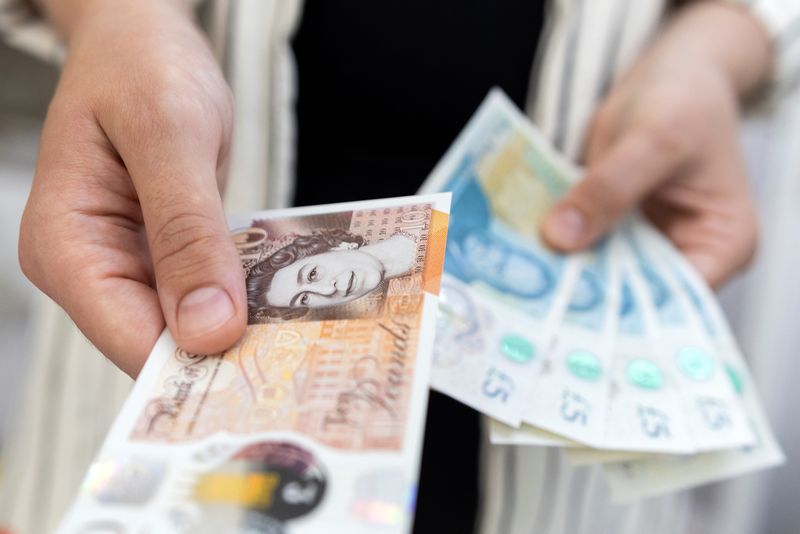By Samuel Indyk and Joice Alves
LONDON (Reuters) - The British pound was set for its biggest one-day rise against the dollar in almost three weeks on Wednesday, as the latest UK inflation numbers reinforced bets that the Bank of England will likely hike interest rates again.
Sterling surged 0.35% against the dollar to $1.2756, after hitting an almost one-week high of $1.2767 and was set for its biggest one-day jump since July 28.
Against the euro, it rose 0.2% to 85.68 pence, after touching its highest level since Aug 1.
Consumer price inflation slowed to 6.8% in July. But core inflation, which strips out volatile food and energy prices, remained at 6.9% in July, flat versus the June reading, and higher than economist expectations for a reading of 6.8%.
Services inflation picked up to 7.4% from 7.2% in June.
"Core inflation remains stubbornly high at 6.9% and is now slightly above the headline level," said Oliver Blackbourn, multi asset portfolio manager at Janus Henderson Investors.
"This presents a headache for the Bank of England as it will want to see this less volatile measure decline to suggest that cost pressures are sustainably returning to target."
A separate set of data showed that British house prices increased by 1.7% in the 12 months to June, the smallest rise since July 2020 as Britain's housing market has come under strain from higher mortgage rates after 13 back-to-back BoE interest rate hikes.
In the meantime, British wages grew at a record pace in the second quarter, data on Tuesday showed, adding to the BoE's inflation worries.
Money market traders now fully price a 25 basis points (bps) hike at the central bank's next meeting in September. But amid stubborn inflation, they have started to price in around a 10% chance of a larger half-point rate rise, according to Refinitiv data.
Markets also price in a total of 75 bps of tightening by the February 2024 meeting, implying the BoE's bank rate would hit 6%, up from 5.25% currently.

"It's clear that the extent of UK monetary policy tightening required will be more substantial than in the U.S. and euro zone," said Hussain Mehdi, macro & investment strategist at HSBC (LON:HSBA) Asset Management.
"The persistent shortfall in UK labour supply is translating to upward pressure on wages, and thus the need for a 'higher-for-longer' interest rate scenario."